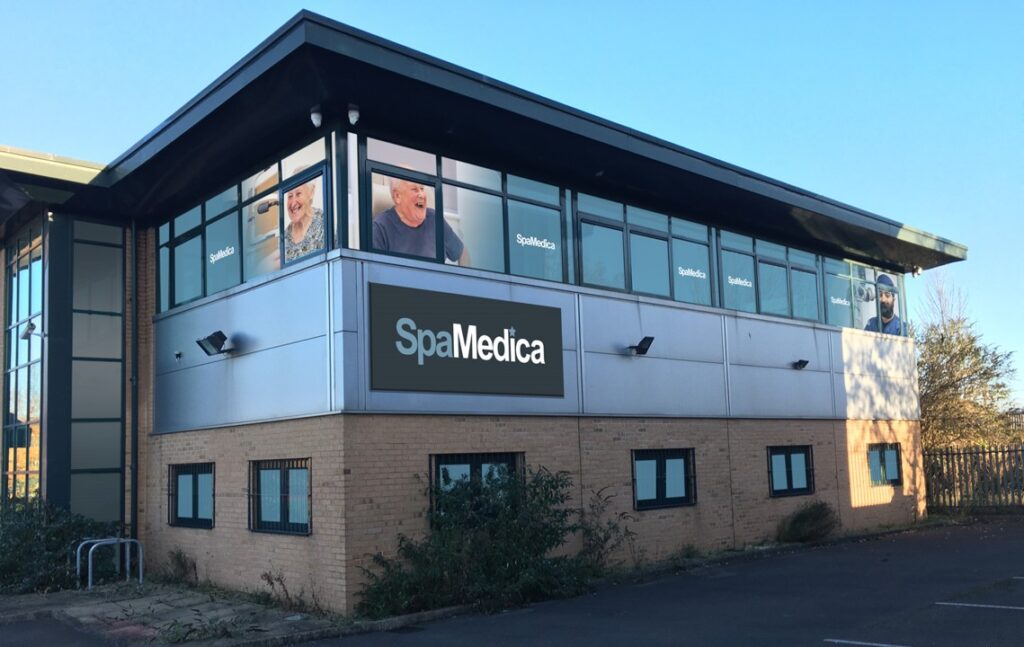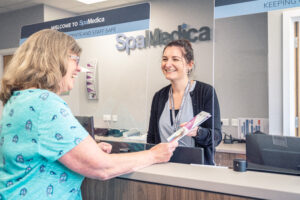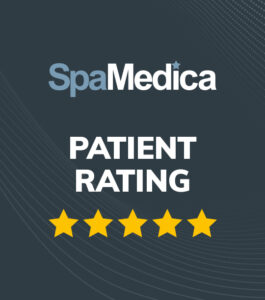Bradford
Standard House, 11 Trevor Foster Way, Bradford BD5 8HB
Standard House, 11 Trevor Foster Way, Bradford BD5 8HB
Opening hours:
Mon to Sat 8:00 - 18:00
Tel: 0330 058 4280
Our Bradford hospital is a modern, state-of-the-art facility, which opened in October 2018. Our hospital facilities here are first-class and equipped with the latest technology.
We look forward to welcoming you to SpaMedica Bradford. The team here will welcome you with a smile and answer any questions you have about your appointment or surgery.
Conditions we treat
Getting treatment
How to find us
SpaMedica is located within the Eccleshill NHS Treatment Centre. There is free onsite parking available directly in front of the hospital and parking spaces available around the back of the hospital. There are also disabled parking bays for blue badge holders.
The hospital is situated on Park Road off the A658 - Harrogate Road, accessible from both the North and South.
Park Road intersects Harrogate Road at a crossroad junction. If you are travelling south down Harrogate Road you will turn left into Park Road, just past a pedestrian crossing and traffic lights. If you are travelling North you will turn right into Park Road, just before the pedestrian crossing and traffic lights. Please take the first right after you have turned onto Park Road – you will see signs for both Eccleshill NHS hospital and SpaMedica. Follow the road round the left bend, past the community hospital, all the way down to the end, where you will see the treatment centre with our SpaMedica sign above the door and use any of the patient parking spaces closest to the building.
948 Wharfedale Links bus - Park Road 5-minute walk
660 bus – A658 Harrogate Road 7 minute walk
747 Flying Tiger – A658 Harrogate Road 7-minute walk
884 bus – A658 Harrogate Road 7 minute walk
You can get to Eccleshill NHS Treatment Centre by train and bus. Please use either of the websites below to help plan your journey:
If you live in England, all you need to do is let your optician or GP know which healthcare provider and hospital location you would like to have your cataract treatment at, and they’ll send a referral to your chosen provider. You should hear back from your provider within two to three weeks following your referral. If you haven’t heard anything after this point, we recommend contacting the person who referred you—this will be your optician or GP—to check on the status of your referral.
Giving you local access to the highest standards of care. With over 61 hospitals nationwide, all rated 'Good' or 'Outstanding' by the Care Quality Commission, SpaMedica is the largest independent provider of NHS cataract treatment in the UK. Our experts will ensure you feel comfortable and confident from diagnosis to recovery. Having partnered with the NHS for over 15 years, we proudly support thousands of patients every month with ophthalmic conditions.
The only suitable treatment for cataracts is surgery. It is one of the safest surgeries you can have and is also the most common operation performed in the UK today, taking up to only 20 minutes for routine cases. The cloudy lens is removed and replaced with an artificial lens (implant). This is normally done under a local anaesthetic using eye drops to numb the eye.
Leave a review
Got a story to share? Let us know what you think by leaving us a review.
Frequently asked questions
A Yag Laser Capsulotomy is a procedure used to treat a cloudy capsule behind the lens that may develop after cataract surgery. The laser creates a hole in the capsule to improve vision.
Cataracts are a clouding of the lens in the eye which can cause blurry vision and difficulty seeing in low light conditions.
Common symptoms of cataracts include blurry or cloudy vision difficulty seeing at night sensitivity to glare and faded colors.



